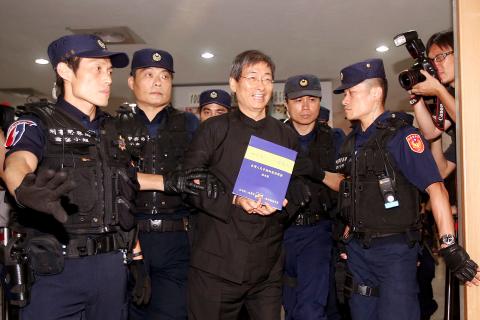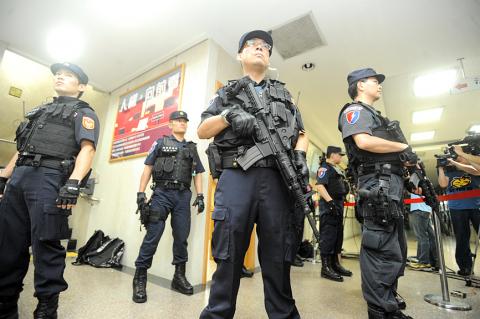Former gang leader and wanted fugitive Chang An-le (張安樂), also known as the “White Wolf,” was released on NT$1 million (US$32,870) bail a few hours after his return to Taiwan from China yesterday.
Police handcuffed the 65-year-old as soon as he stepped off an Air China plane yesterday at Taipei International Airport (Songshan airport), where nearly 600 officers, including SWAT team members, had been waiting for several hours.
Chang, who flew in from Shanghai after 17 years on the run, smiled and looked relaxed while being escorted by policemen through security inspections at the airport.

Photo: CNA
He was taken directly to the Taipei District Prosecutors’ Office after clearing immigration.
Chang, who had been on Taiwan’s most-wanted list for alleged violations of the Organized Crime Prevention Act (組織犯罪防制條例) since fleeing to China in 1996, is barred from leaving Taiwan, the Taipei District Prosecutors’ Office said.
Members of the Unionist Party, which Chang had founded while he was hiding in China, and of the triad he helped lead in his younger days — the Bamboo Union — showed up outside the airport to “welcome back the president of the Unionist Party.”

Photo: Wang Yi-sung, Taipei Times
The police had issued a permit for a rally to be held just outside the airport.
Chang carried a leaflet advocating “peaceful unification” and “one country, two systems.”
During his years in China, Chang pursued a business career, and founded the Unionist Party in Taiwan.
“No matter how long they put me in jail for, I’ll be free eventually,” he told a Chinese newspaper earlier this month. “Then I’ll continue my political charity work.”
Chang’s lawyers, Yu Ying-ta (杜英達) and Chang Li-yeh (張立業), went to Shanghai on Friday to meet Chang and accompanied him on the flight.
Chang Li-yeh said that most other suspects in the investigations involving Chang An-le had been either released or found not guilty.
The lawyers quoted Chang An-le as saying that he wanted to prove his innocence before Taiwan’s justice system, adding that he had not negotiated with the Ministry of Justice for his return.
Chang An-le is most famous for his role in the 1984 Henry Liu (劉宜良) case.
Liu, a naturalized US citizen, wrote an unauthorized and unflattering biography of then-president Chiang Ching-kuo (蔣經國) under the pen name Chiang Nan (江南).
Liu was gunned down in his home in Daly City, California, by two of Chang’s fellow triad members, allegedly on the orders of the chief of Taiwan’s military intelligence at the time.
Chang, who was living in California, did not take part in the assassination, but made public a tell-all tape recorded by the two hitmen after they were arrested upon their return to Taiwan.
Chang was subsequently placed under arrest on drug-related charges and sentenced to 15 years in a US prison.
He ended up serving two-thirds of the term, during which he earned two college degrees, arguably making him the best-educated of Taiwan’s gangsters.
Chang returned to Taiwan after being released from prison and was accused of playing an active role in the Bamboo Union, which allegedly made huge profits by setting up companies and winning lucrative business contracts by scaring away competing firms.

PREPAREDNESS: Given the difficulty of importing ammunition during wartime, the Ministry of National Defense said it would prioritize ‘coproduction’ partnerships A newly formed unit of the Marine Corps tasked with land-based security operations has recently replaced its aging, domestically produced rifles with more advanced, US-made M4A1 rifles, a source said yesterday. The unnamed source familiar with the matter said the First Security Battalion of the Marine Corps’ Air Defense and Base Guard Group has replaced its older T65K2 rifles, which have been in service since the late 1980s, with the newly received M4A1s. The source did not say exactly when the upgrade took place or how many M4A1s were issued to the battalion. The confirmation came after Chinese-language media reported

The Taiwanese passport ranked 33rd in a global listing of passports by convenience this month, rising three places from last month’s ranking, but matching its position in January last year. The Henley Passport Index, an international ranking of passports by the number of designations its holder can travel to without a visa, showed that the Taiwan passport enables holders to travel to 139 countries and territories without a visa. Singapore’s passport was ranked the most powerful with visa-free access to 192 destinations out of 227, according to the index published on Tuesday by UK-based migration investment consultancy firm Henley and Partners. Japan’s and

A Ministry of Foreign Affairs official yesterday said that a delegation that visited China for an APEC meeting did not receive any kind of treatment that downgraded Taiwan’s sovereignty. Department of International Organizations Director-General Jonathan Sun (孫儉元) said that he and a group of ministry officials visited Shenzhen, China, to attend the APEC Informal Senior Officials’ Meeting last month. The trip went “smoothly and safely” for all Taiwanese delegates, as the Chinese side arranged the trip in accordance with long-standing practices, Sun said at the ministry’s weekly briefing. The Taiwanese group did not encounter any political suppression, he said. Sun made the remarks when

BROAD AGREEMENT: The two are nearing a trade deal to reduce Taiwan’s tariff to 15% and a commitment for TSMC to build five more fabs, a ‘New York Times’ report said Taiwan and the US have reached a broad consensus on a trade deal, the Executive Yuan’s Office of Trade Negotiations said yesterday, after a report said that Washington is set to reduce Taiwan’s tariff rate to 15 percent. The New York Times on Monday reported that the two nations are nearing a trade deal to reduce Taiwan’s tariff rate to 15 percent and commit Taiwan Semiconductor Manufacturing Co (TSMC, 台積電) to building at least five more facilities in the US. “The agreement, which has been under negotiation for months, is being legally scrubbed and could be announced this month,” the paper said,